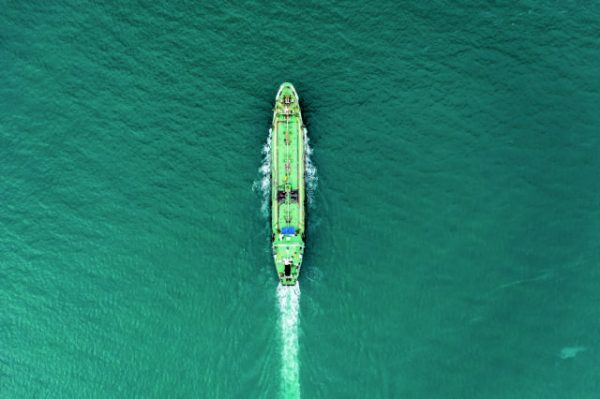
Greece remains the leading shipping country in the world, holding 21% of the world fleet, in terms of tonnage (dwt), with 5,514 ships. “In the fluid global environment, shipping has functioned and is functioning as a beacon of stability,” said in her message the president of the Union of Greek Shipowners, Melina Travlou.
According to the annual report of the Union of Greek Shipowners, which was published today, Greek shipowners continue to invest steadily in ships with greater efficiency and environmental benefits.
The total capacity of the Greek-owned fleet has increased by 45.8% compared to 2014, while even during the COVID-19 pandemic, ie from 2019, the capacity increased by 7.4%. The Greek-owned merchant fleet transports cargo between third countries at a rate of more than 98% of its capacity, making it the largest cross-border carrier in the world.
Specifically, Greek shipowners control:
31.78% of the world fleet of oil tankers
25.01% of the world bulk dry cargo fleet
22.35% of the global Liquefied Natural Gas (LNG) transport fleet
15.60% of the global fleet transporting chemicals & petroleum products
13.85% of the global Liquefied Petroleum Gas (LPG) fleet
9.33% of the global container fleet
In addition, the Greek-owned fleet represents 59% of the fleet controlled by Member States of the European Union (EU), which is more than 75% active in the bulk / tramp sector, while one third of the Greek-owned fleet bears the flag of a Member State EU.
As it is emphasized, Greek shipowners are constantly investing in new, energy efficient ships and environmentally friendly equipment. The average age of the Greek-owned fleet (9.99 years) is lower than the world average (10.28 years).
New orders
Shipbuilding orders from Greek shipowners amount to 173 ships (from 104 ships last year), corresponding to 17.3 million dwt. More than a third of the oil tankers and almost one in six LNG carriers currently being built worldwide will be delivered to Greek shipowners. In addition, more than a quarter (27.6%) of Greek-owned tonnage (in dwt) falls within the scope of the Global Ship Design Energy Performance Index (EEDI) standard, a technical measure of the United Nations International Maritime Organization (IMO), which ensures improved energy efficiency for ships.
At the same time, Greek shipowners are steadily investing in larger ships that also have greater efficiency and environmental benefits due to economies of scale. Since 2014, the increase in capacity (in dwt) of the Greek-owned fleet is much greater than the increase in the number of ships.
Capacity of Greek-owned ships almost twice the average
In 2014 the average capacity of Greek-owned ships was 71,308 dwt, while today it is estimated at 86,247 dwt, a number almost double that of the world fleet (45,020 dwt).
It is important to note that shipping is the most efficient means of freight. This is evidenced by the fact that in the last 50 years, although world maritime trade has quadrupled in volume, CO2 emissions from shipping have just doubled.
Occupying the 8th place in terms of capacity (dwt), Greece is one of the most important registries in the world and one of the top among traditional shipping countries. With 647 ships (over 1,000 gt), registered under the Greek flag, with a capacity of 61.8 million dwt, the Greek registry ranks 2nd in the EU.
Union of Greek Shipowners President: We declare ourselves present, strong and ready
Introducing the annual report 2021-2022 of the Hellenic Shipowners ‘Association, the president of the Hellenic Shipowners’ Association, Melina Travlou, said: as well as for its long-term, consistent, multidimensional offer to Greek shipping.
In the fluid global environment, shipping has functioned and is functioning as a beacon of stability, responding to the unprecedented conditions we are facing in recent years with the international health crisis, but also in recent months with the geopolitical crisis in Europe. Once again, the shipping industry has highlighted its strategic and substantive dimension and its crucial contribution to the functioning of the global ecosystem.
Aware that society as a whole does not have a complete picture of the irreplaceable and varied services offered by our industry, I invite you, all of us who belong to the shipping family, to act as messengers of the vital role of shipping internationally.
Greek Shipping, which owns 21% of the world fleet and 59% of the Community shipping, has a responsibility to undertake and support initiatives to inform and enlighten the general public about the strategic importance of the industry, as well as the need to prioritize it by global politicians.
In this context, the issue of environmental awareness and the green footprint of shipping is included in the major issue of climate change. Shipping, as an industry, has timely adopted and implemented a truly environmental and efficient operation, which is constantly improving. In addition, it continues to be at the heart of a storm of legislation at international and regional level for the adoption of drastic environmental measures aimed at complete carbon sequestration.
The fact is that shipping drastically minimizes pollutants, while at the same time constantly investing in new, modern technologies, environmentally advanced and certified, with Greek-owned shipping starring in environmentally friendly new ships.
Latest News

German Ambassador to Greece Talks Ukraine, Rise of Far Right & Tariffs at Delphi Economic Forum X
Commenting on the political developments in his country, the German Ambassador stressed that it was clear the rapid formation of a new government was imperative, as the expectations across Europe showed.

Athens to Return Confiscated License Plates Ahead of Easter Holiday
Cases involving court orders will also be excluded from this measure.

Servicers: How More Properties Could Enter the Greek Market
Buying or renting a home is out of reach for many in Greece. Servicers propose faster processes and incentives to boost property supply and ease the housing crisis.

Greek Easter 2025: Price Hikes on Lamb, Eggs & Sweets
According to the Greek Consumers’ Institute, hosting an Easter dinner for eight now costs approximately €361.95 — an increase of €11 compared to 2024.

FM Gerapetritis Calls for Unified EU Response to Global Crises at EU Council
"Europe is navigating through unprecedented crises — wars, humanitarian disasters, climate emergencies," he stated.

Holy Week Store Hours in Greece
Retail stores across Greece are now operating on extended holiday hours for Holy Week, following their Sunday opening on April 13. The move aims to accommodate consumers ahead of Easter, but merchants remain cautious amid sluggish market activity.

Green Getaway Ideas for Easter 2025 in Greece
Celebrate Easter 2025 in Greece the sustainable way with eco-farms, car-free islands, and family-friendly getaways rooted in nature and tradition.

Civil Protection Minister Details Summer Firefighting Plans at Delphi Forum
At the 10th Delphi Economic Forum, Minister of Climate Crisis and Civil Protection Yiannis Kefalogiannis discussed Greece's plans for the upcoming fire season.

How Shops and Markets Will Operate During Easter Holy Week
The Easter holiday schedule has been in effect since April 10, with retail stores open Palm Sunday, and most supermarkets also operating to meet consumer demand for Easter shopping

Why Is the French Aircraft Carrier Charles De Gaulle in Piraeus?
Docking in Piraeus after a four-month deployment in the Indo-Pacific region, the admiral of the aircraft carrier the Charles de Gaulle says, "Greece is our best partner in the Mediterranean."








































 Αριθμός Πιστοποίησης
Αριθμός Πιστοποίησης